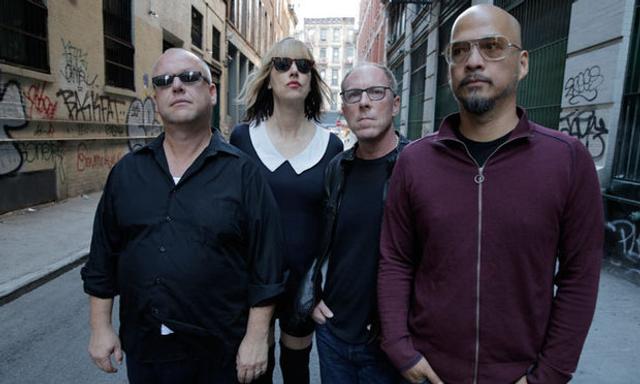After racing out of the traps with five albums in their first five years of existence, the Pixies' output considerably slowed as in-fighting and bickering stunted their momentum. It's been twenty-two long years since the release of their last long-player Trompe Le Monde but now, armed with their first new material in many a year, as well as a new bassist Kim Shattuck in place of founding member Kim Deal, the Pixies look set to take over the world once again. Ahead of their two sold out shows in Dublin's Olympia Theatre next week (18th/19th November), John Balfe caught up with Pixies drummer Dave Lovering for a chat about getting back into recording, how they felt when Kim Deal quit the band and more.
It's been a long time since the Pixies have toured with new material. How has the reaction been so far to the new stuff?
It's going down really good! I've been quite surprised at it. We're mixing it up with a lot of older stuff that we never really played a lot of, so it's making quite a good dynamic. And no one is going off the restroom at that time either! (laughs)
Since the Pixies reunited in 2004 you have played almost exclusively material that was written in the late 80's and early 90's. Was it creatively fulfilling to be doing that for such an extended period of time?
It was interesting. When we started back up in 2004 it was seven years [2011] before we thought, 'Holy jeez, we have been doing this longer than we were initially a band'. It just kept going and going but we decided, even though we love touring and were still getting asked to do shows, that we couldn't just keep doing this in case we wear out our welcome. We talked about three years ago about writing new material. Charles [Black Francis] sat around for a time and it just took about three years for it to come to fruition.
You touched on it there, but was there any precise impetus that led to the decision to write new material?
It was a gradual thing. We were on the road, probably around the seven year mark, and we were doing shows in far-out places in Canada, for example, and they didn't have a particular venue so when we were booked to play a casino I thought in my mind, 'oh jeez, are we turning in Blue Oyster Cult?' We didn't want to be called a nostalgia band. So that was the impetus of it. When we started talking about a producer, easily the one that came to mind was Gil Norton because he did our previous three or four albums.
What was it like recording in Wales?
It was a great experience but I have to tell you John, I hate recording. I cannot stand it. I dread it because you're on the spot and I like to be a perfectionist and it can be very hard and frustrating to do. But on this one, the first time we'd done it in a number of years, I went in with a whole new attitude and it was a joy. I was very happy with everything I did and it was a wonderful experience for me.
Why did you have a new approach to recording this time around?
It's a combination of everything. When we did Come On Pilgrim - which was basically our first demo tape - that was after we played for about a year and a half. And then every album after that came quicker and quicker and quicker. I was very frustrating. I want to say also because of your memories of recording not really being that fun but I went in with a whole new attitude and worked my ass off on all the new songs and it worked out for me.

L-R: Kim Shattuck, Dave Lovering, Black Francis, Joey Santiago
Did it take time for you all to collectively recapture the creative spark?
I have to say John that the way record songs is the same now as it ever was. Charles would come in with material and we would just jam on it and nothing has changed; it was the same in the studio expect that it was digital this time, not tape, so that the only difference I can really say.
You've set a very high bar for yourselves with the back catalogue. What makes a Pixies song and how do you recognise one when you come across it while jamming?
It's not a formula but many people say that it's 'loud/quiet/loud'. I have to say, from my point of view, I can't look at it and nail what it is that we do. Like I said, there isn't a formula but we probably have guidelines about what we do and I couldn’t even put a finger on what those guidelines are. We had a lot of democracy in terms of what we liked, or what we thought was good, and we were happy with the outcome.
I found the single you released a few months ago, 'Bagboy', very interesting because while it definitely sounds like a Pixies song it doesn't necessarily sound like a song you would have written 20 years ago.
It's interesting. A lot of the flak that I've seen as far as people complaining about the new material, they say 'this doesn't sound like Pixies' but I think that Surfer Rosa didn't sound like Trompe Le Monde and Doolittle is not going to sound like EP1.
With regards to Kim leaving the band, how much of a jolt was that to Charles, Joey and yourself? Was there ever a chance of you all calling it a day?
There's always shit. Something goes down with the Pixies! I just had that in the back in the mind that something was going to go down. Then, of course, Kim announces her departure during recording and it was pretty heavy. For at least three days we were very emotionally tired. We didn't know what to do. Should we just pack up and call it a day? We talked and talked about it well into the night and decided, because we had a month left in the studio, just to finish it. So we just worked and worked and worked on it.
Does Kim have much input into the songs that were written?
We did about five songs and we did a little pre-production beforehand. Before we recorded them we had another room where we just worked on the songs. I know that in 'Indie Cindy' there's a little stop in the song, and that was Kim's input and there was other stuff that was changed too just by us working on songs [together].
Over the years I've heard lots of stories about the Pixies it being quite a volatile in the band. Was there ever a period where you considered it an unhealthy environment?
No, because when I look back on it we were a dysfunctional band - like most bands are - because we're four people stuck in a tour bus. I'm a bit guilty myself as far as my behaviour; I'm not much of an angel. The thing is, this was the first band we were in - we were 20, 21 years old - we didn't know any different. So it wasn't anything I could just look at or reflect on and say, 'I gotta get out of here'. It was hard dealing with things but it's just that was the way it was.

EP1 - The first extended release of original material by the Pixies since 1991's Trompe Le Monde
Pixies are seen as one of the most influential bands in modern rock history and have been lauded by critics for decades now. Is it difficult to evaluate these assertions from your perspective on the inside, so to speak?
Yes, it' incredibly difficult. I read all these things about us being legends, or being influential but to me I'm just Dave - the guy that plays the drums. The only way that I can equate it is if I go see some of my favourite bands like Rush. I met Rush once and I was like, 'Oh my god'. If I equate that and put it together I can understand what people might make of the Pixies but this is my job - that's how I look at it.
David Bowie was quoted as saying that you made the most compelling music of the 80's, I'm sure you've heard that Kurt Cobain said that 'Smells Like Teen Spirit' was his attempt at writing a Pixies song. Is it difficult to take those things on board?
That's really nice to hear but I'm pretty down to earth and it just flies over my head.
You mentioned Rush a moment ago. Neil Peart, their drummer, was famous for his huge kit. What it your setup like these days?
Nowadays my kit is very minimalistic. I have the least amount of cymbals I've ever had and also they're very low because I'm getting old! It took me this many years to figure out what ergonomics is and I think I'm playing the best I can and it's because they style and the way I position my drums now. I just can't believe it's taken me this long to do it.
I understand that Europe was a lot more receptive to the Pixies in the early days compared to the United States. Did you notice any particular distinction between the two audiences?
Yes, the crowds were definitely more fervent and much more into the Pixies when we were over in Europe and the UK. I hate to put down America but I think you guys had better taste, that's what it seemed to me! The first gig we did in the UK was at the Mean Fiddler in London and that was surreal, eye-opening and just amazing. Crowds were going ballistic, it was mayhem but it was wonderful.
Expect more of the same in the Olympia next week! Thanks for your time Dave.
Thank you!
Image: Kevin Scanlon / New York Times









































































